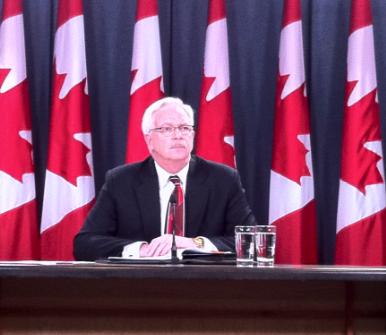Bill Whatcott’s lawyer attempted to make a distinction between public criticism of the sexual conduct of gays and lesbians and general condemnation of homosexuals in the Supreme Court of Canada hearing of his case on Oct 12.
Whatcott and several other religious organizations argued before Canada’s top court that they should be allowed to express moral and religious views in public, which includes the distribution of homophobic leaflets.
Whatcott’s lawyer, Thomas Schuck, argued that Whatcott was targeting behaviour in order to protect children, which is why his leaflets use the word “sodomite” rather than “homosexual.” They argued a homosexual could be celibate.
Schuck told the seven judges that a child would die if it is sodomized. He said Whatcott should be congratulated for exposing pedophiles.
The case pits the Saskatchewan Human Rights Commission (SHRC) against Whatcott and the religious groups, a fight that has been in and out of other Canadian courts since Whatcott distributed flyers in Regina and Saskatoon in 2001 and 2002.
In them, Whatcott reprinted personal ads from Perceptions, a gay magazine, and highlighted those relating to “men seeking boys” and language such as “age unimportant.”
Other flyers targeted educational policy with phrases like “Our children will pay the price in disease, death, abuse . . . if we do not say no to the sodomite desire to socialize your children into accepting something that is clearly wrong.”
Whatcott originally lost a discrimination case brought against him before the SHRC but later convinced a Saskatchewan Court of Appeal that he was exercising his right to freedom of expression.
Whatcott has admitted to engaging in gay sex in his youth but does not characterize himself as “ex-gay,” saying he did it to pay off a drug dealer.
Cynthia Petersen, the lawyer representing Egale Canada, warned against making a moral distinction between sexual identity and sexual conduct.
“It’s a dangerous precedent to lead down,” Petersen says. “When you conceptualize hate speech of this sort in the flyers as if it’s just about conduct, it’s not about you as a person, it denies the reality of lesbian and gay existence.”
Petersen and others, including the SHRC, believe the Saskatchewan Court of Appeal judgment creates a tiered system of human rights protections.
“Egale is very concerned about that because we fought for a long time to have sexual orientation included in human rights legislation, and we are now included in every jurisdiction in Canada, so those statutes have to be interpreted in a way that protects all of the vulnerable groups equally,” Petersen says. “We can’t have a tiered system where there’s more protection when the discrimination is based on race or religion than there is if it’s based on sexual orientation.”
Kathleen Mahoney, from the Women’s Legal Education and Action Fund, says Schuck’s line of reasoning is unacceptable.
“This is what this argument about morality – we love the gays but we hate the gay behaviour – is all about,” Mahoney says. “What it does, effectively as well as legally, is denigrate that group to having second-class status, because their rights are not being fully protected, just as if we still separated pregnancy from being female.”
Others, including the Canadian Civil Liberties Association (CCLA), have argued that Whatcott’s flyers should not be considered hate speech.
“Does he have to be intending to hate or promote hatred? Is it the listener who hears this?” asked the CCLA’s Andrew Lokan on the question of whether the Supreme Court should strike down hate speech provisions in Saskatchewan human rights law. “Is it some kind of objective person? My point on behalf of the CCLA was it’s going to vary so much from person to person that this is not the best way to regulate speech.”
However, the SHRC thinks Whatcott could provoke debate without the hateful language in the flyers.
“Fundamentally, freedom of religion does not include the right to use hateful, powerful words, which are transparently hateful,” says Chief Commissioner David Arnot. “In other words, freedom of religion plays only a very marginal role in this case. This case is fundamentally about freedom of expression and the reasonable limit, the justifiable limit that we say exists with respect to that type of speech, hate speech, in the Canadian context.”


 Why you can trust Xtra
Why you can trust Xtra


